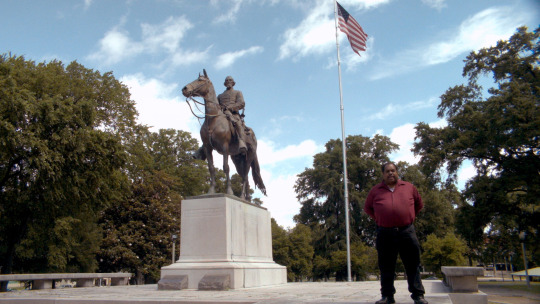I
I reviewed Accidental Courtesy back at SXSW when it premiered. This is a slightly revised version from the one that ran back then.
This is a portrait of Daryl Davis, a black musician, actor and writer who makes a point of sitting down with members of the Ku Klux Klan and other hate groups in order to find out why they think the way they do. Davis wants to start a dialog with those who hate figuring that perhaps he can change the world one person at a time. The result of the talks is minds have been changed and friendships formed. But there are complications...
The film begins with Daryl Davis sitting down and telling the story of getting a call from a local Klan leader who needed to get a bus so he could stage a march. The leader wanted to know if Davis knew a company that would rent to them because no one wanted to rent to the Klan. Davis told him that if they paid for the gas the Klan could borrow his bus. Its a wild story, and while it seems crazy at the start, by the end it makes perfect sense.
Enlightening documentary that succinctly and clearly explains that change can come and it doesn't have to be violent. Its a film that shows clearly when the people talk change can happen. It also shows the trouble when a common ground can't be found such as when Davis talks with several activists in Baltimore for the Black Lives Matter Movement who want the whole system changed now and not done one person at a time.
Its been several days since I saw this film and I'm still trying to work out how I really feel about it. For most of the first hour or so I thought it was a really good, if a tad over long film about the power of conversation to change the world by changing it one person at a time. It was and is a really good film with some amazing stories and an intriguing man at it's center
The trouble is that in the last half hour the film bumps up against the Black Lives Matter protests and the film becomes something else entirely. With Davis's heated discussion with three men who were in the trenches during the recent protests in Baltimore the film suddenly becomes weirdly alive. This isn't to say that it wasn't before, but with in the confrontations and shouting the film suddenly has a connection to the moment we are living in instead of being one man trying to change what seems to be a dying way of life. With the confrontation you suddenly realize that open hatred of the Klan has been replaced by something darker. It also reveals the gulf between finding a slow path to change and the need for the destruction of a system that is failing badly and killing people. It's a sequence that shatters much of what before since you see problems with Davis's approach since you see the desperation of the now.
The sequence is stunning- literally. It stops the film dead. It makes it difficult to watch the sequences after it when Davis is talking to the Klansmen because it's the exact opposite of that sequence. It makes what follows hard to take because we've been forced to reconsider everything that goes on around it. Its makes the leisurely pace of the first hour seem glacial and makes the 15 or 20 minutes that follow kind of bland. I understand that the return to the Klan shows how Davis continues on but the connection to him is kind of fractured. We are left wondering if what he is doing is the right way to make change. It also alters how we see Davis since the passion and the words of the protesters make you have to rethink Davis's motives.
Is Davis right or wrong? I don't know- though I suspect he's both.
As I said above several days have passed and I am still left trying to sort out what the confrontation means in the larger scheme of the film. It was always clear that much of went before, and after was controlled. People Davis knows came in to talk about him and their confrontations. In Baltimore it wasn't controlled and it gets down right hostile. Davis holds his temper, mostly, but it's clear that he is coming from a different place than the three black men he talks to.
I'm so rattled by the sequence and its upsetting the apple cart that I honestly don't know what I think of the film is it the very good/ great film I thought to start or has that changed? (It's definitely a good film)
This is a film that in the last several days I kept recommending to fellow writers whose opinions I trust in order because the film was something that had to be on their radar. I wanted them to contact the filmmakers and arrange screenings so that they could join the discussion. This is a film that has to be seen and discussed. The dialog this film kicks up, for better or worse has to be had. (and once more people have seen it I'll return to actually have that discussion)
Uncertainty or no on my part there is no way I think the film is absolutely important and vital.
Yes you should see it - you must see it.
Most definitely one of the most affecting and challenging films of the year. If want a film that is going make you react this is it.

No comments:
Post a Comment